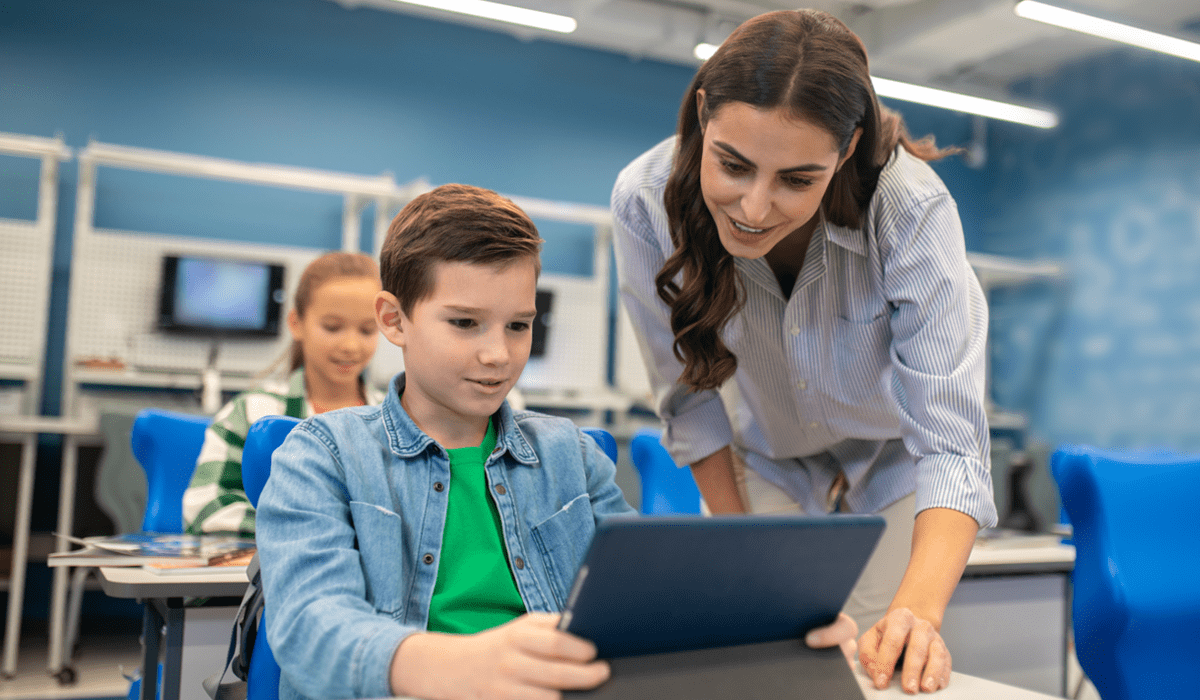More and more parents, when choosing a future reference point for their children, pay attention to IT – it is a promising, highly paid and constantly expanding field. And programming trains the mind and forms a bunch of skills. But how does it affect a child's developing brain?
Content ▼
Why programming?
How does the brain see the code?
How does programming help in learning other subjects
When to start programming?
How to choose a course?
Why programming?
Programming is, first of all, intellectual training. And the brain, like any other muscle, needs to be kept in good shape and regularly trained. Especially at a young age, when new information is absorbed easily and quickly.
When we talk about intellectual exercises – for example, games – we think of something purely aimed at a complex thought process: chess, Sudoku and other puzzles. Of course, they develop the brain, but they do not give room for creativity, which is necessary for a person at a young age. Children are curious: they love to create and try new things, and it's worth encouraging for the sake of developing their creative thinking.

The physical and mental development of a child are equally important.
Programming is very multifaceted. They create useful programs, virtual worlds and everything they want, and hundreds of games have been invented for children to explore it. Therefore, this is an easy way to get a child interested in something useful, to help him realize his ideas and at the same time make a contribution to the future.
How does the brain see the code?
Let's turn to research: when examining the code, five brain regions of both hemispheres are involved, and this activity is not similar to working with mathematical calculations, nor to the perception of foreign languages: even when analyzing cycles and variables, the clusters of the brain responsible for calculations are poorly involved. But the areas responsible for memory, attention and language skills work well.
Both hemispheres are also involved in writing code, but the “mathematical” part continues to work and use cognitive mechanics even when the input data is structurally similar to a conventional, non-programming language.
That is, externally technical programming has its own unique ways of developing the human brain – the technical and humanitarian parts of it at the same time.
At the same time, programming experience increases cognitive abilities by 16%, and has a positive effect on the development of language and socio-emotional skills. As for children's programming, it improves thought processes, pumps divergent thinking and metacognitive abilities. All these complex terms denote the ability to analyze situations and tasks and find as many solutions to them as possible. Including non-standard ones.

Coding is a proven useful exercise for any age.
As we have already said, the brain is a muscle that needs to be trained. Regular exercise leads to better results, and better results mean high mental and intellectual abilities in the present and future: the more intellectually active people are, the more efficiently their brain works and the longer they keep it in good shape, which protects against diseases and memory loss in old age.
Healthy habits now lead not only to quick thinking and work productivity, but also to good health in the future.
How does programming help in learning other subjects
Development and training are complex affairs, and consist of many aspects and disciplines. Programming speeds up the assimilation of all of them. How? It's all about thinking and approach: working with the code, the child learns to calmly react to his mistakes and immediately solve them instead of being sad because something did not work out.
For example, you write code. Something is not working. You immediately find the error and correct it. It's working! A quick result makes the brain get used to working according to the scheme "finding a problem → solving → getting a result", and it is transferred to other subjects and spheres of life.

And also writing code requires care and teaches you to do the job carefully – any missing character can lead to an error.
People often make mistakes, and children who have no experience and try many things for the first time, even more so. Having learned not to focus on failure, the child will improve any skill faster. The effect enhances the excellent development of thinking skills, which we discussed earlier.
When to start programming?
The sooner the better. The sensitive period of a child's development ends by the age of six, and programming can contribute to the formation of a young mind even before the start of school. This does not mean that if you decide to introduce your child to the profession of the future, you need to teach him to sit at the computer from an early age: fifteen minutes a day is enough.

The best approach to developing any skill – regularity.
From how old is it best to teach a child programming?
Scientists from the British Institute of IT Technologies believe that the best age for this is 5 years (at this age, British children go to the first grade of school). First, children form logical skills through live games, then from the age of 7 to 11 they learn the basics of coding and work with programs on computers, and at the last stage, until the age of 14, they learn two programming languages to choose from and create their own programs.
This methodology has also been approved by the Royal Academy of Engineering and Google and Microsoft corporations, but it is not the only one: in Estonia, children have been studying programming in primary schools since 2012. Moreover, according to The Age, programming is also studied in schools in Italy, the Netherlands, Finland, the USA and several other countries.

There is no programming in the Russian school curriculum yet, but you can catch up at home.
Elementary school is an ideal time to thoroughly take up coding, but a child can learn its basics and understand the basic principles even in kindergarten.
What do the experts say?
Andrey Skuryatin, developer of the online school “Foxford”:
❝ In programming, the main thing is ability or desire, then you can start at any age. But, of course, the sooner you start, the better. At the same time, in childhood there is much more time even for crazy experiments.❞
Some fundamental concepts do not just need to be known, they need to be properly put in your head. But it still takes time.
Oksana Selendeeva, founder of the programming school “CODDY”:
❝ The sooner the better. The whole world is moving towards IT: digital penetrates into every sphere, and a deep understanding of computer technology becomes a new basic literacy. The sooner a child starts learning programming languages, the faster he will "speak" them.❞
<...> The child learns to find information faster and solve problems more effectively, actively develops logical and algorithmic thinking. These skills will make him more successful in school and more competitive in the future. Everything is exactly the same as with English: children who get to know it in a playful way from the cradle, then do not need boring lessons and tutors.
Another advantage of early programming is the ability to immediately form the right habits. Not to watch cartoons, but to create them; not to play computer games, but to program them; not just to use, but to create.
Nikolay Vedernikov, a teacher and methodologist at the online programming school “Kodabra”:
❝ It is best to practice programming from the second grade. During the first grade, the child will finally learn to read, trust the teacher, interact with him, and work with information.❞
But it is more important to focus not on age, but on sincere interest. Most often it occurs around the same age. Children start playing serious story games on computers, so they want to "dig" into the device of the game, make their own.

Teachers of programming schools take into account the level and needs of each child.
How to choose a course?
If you can start programming with free online resources or live games, then it will be easier to continue and achieve real results in courses with practicing mentors. When choosing a course, always carefully study the school's website and reviews, ask questions to the manager, and take into account several of the following factors:
- Age and level of training. Training programs are always designed for a specific age group (it must be specified), but the knowledge of the children may be different. If the required level of training is not written on the course page, check this information with the manager. However, most courses teach children from scratch.
- Goal. Programming courses usually end with a project – a game, a website, or a working program. If you are not sure what is suitable for your child, study the information about the different courses with him, and let him choose for himself. As a rule, game development is a win–win option.
- Teachers. Your child's guide to the world of technology should not only know his subject, but also be able to work with children. Make sure that the person you trust with the development of your baby knows his job: study the information about the teachers, read the reviews about the course and communicate with them personally.
- Trial classes. The presence of a trial lesson says little about the level of teaching at school, but the first lesson itself is very verbose. One lesson will allow you to assess the situation, the teacher and the atmosphere at school for both the parent and the child, and will help determine whether it is worth taking a course and continuing to study.
A good course starts with a trial session. Join the CODDY Programming School and attend the first lesson for free.
Conclusion
A parent can contribute to the development of both the humanitarian and technical sides of their child and give him a useful hobby by teaching him the basics of programming already at preschool age with the help of toys, Internet resources and video games. Real statistics show that coding has a positive effect on the brain and our thinking skills, and especially at an early age.
There are no limits to creativity and learning here, and the best way to continue the development of a young programmer in Russia is programming schools that train future successful specialists.